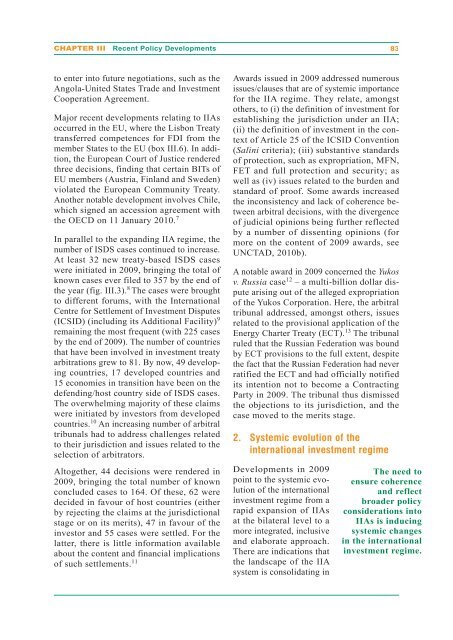UN World Investment Report 2010 - Office of Trade Negotiations
UN World Investment Report 2010 - Office of Trade Negotiations
UN World Investment Report 2010 - Office of Trade Negotiations
You also want an ePaper? Increase the reach of your titles
YUMPU automatically turns print PDFs into web optimized ePapers that Google loves.
CHAPTER III Recent Policy Developments 83<br />
to enter into future negotiations, such as the<br />
Angola-United States <strong>Trade</strong> and <strong>Investment</strong><br />
Cooperation Agreement.<br />
Major recent developments relating to IIAs<br />
occurred in the EU, where the Lisbon Treaty<br />
transferred competences for FDI from the<br />
member States to the EU (box III.6). In addition,<br />
the European Court <strong>of</strong> Justice rendered<br />
three decisions, finding that certain BITs <strong>of</strong><br />
EU members (Austria, Finland and Sweden)<br />
violated the European Community Treaty.<br />
Another notable development involves Chile,<br />
which signed an accession agreement with<br />
the OECD on 11 January <strong>2010</strong>. 7<br />
In parallel to the expanding IIA regime, the<br />
number <strong>of</strong> ISDS cases continued to increase.<br />
At least 32 new treaty-based ISDS cases<br />
were initiated in 2009, bringing the total <strong>of</strong><br />
known cases ever filed to 357 by the end <strong>of</strong><br />
the year (fig. III.3). 8 The cases were brought<br />
to different forums, with the International<br />
Centre for Settlement <strong>of</strong> <strong>Investment</strong> Disputes<br />
(ICSID) (including its Additional Facility) 9<br />
remaining the most frequent (with 225 cases<br />
by the end <strong>of</strong> 2009). The number <strong>of</strong> countries<br />
that have been involved in investment treaty<br />
arbitrations grew to 81. By now, 49 developing<br />
countries, 17 developed countries and<br />
15 economies in transition have been on the<br />
defending/host country side <strong>of</strong> ISDS cases.<br />
The overwhelming majority <strong>of</strong> these claims<br />
were initiated by investors from developed<br />
countries. 10 An increasing number <strong>of</strong> arbitral<br />
tribunals had to address challenges related<br />
to their jurisdiction and issues related to the<br />
selection <strong>of</strong> arbitrators.<br />
Altogether, 44 decisions were rendered in<br />
2009, bringing the total number <strong>of</strong> known<br />
concluded cases to 164. Of these, 62 were<br />
decided in favour <strong>of</strong> host countries (either<br />
by rejecting the claims at the jurisdictional<br />
stage or on its merits), 47 in favour <strong>of</strong> the<br />
investor and 55 cases were settled. For the<br />
latter, there is little information available<br />
about the content and financial implications<br />
<strong>of</strong> such settlements. 11<br />
Awards issued in 2009 addressed numerous<br />
issues/clauses that are <strong>of</strong> systemic importance<br />
for the IIA regime. They relate, amongst<br />
others, to (i) the definition <strong>of</strong> investment for<br />
establishing the jurisdiction under an IIA;<br />
(ii) the definition <strong>of</strong> investment in the context<br />
<strong>of</strong> Article 25 <strong>of</strong> the ICSID Convention<br />
(Salini criteria); (iii) substantive standards<br />
<strong>of</strong> protection, such as expropriation, MFN,<br />
FET and full protection and security; as<br />
well as (iv) issues related to the burden and<br />
standard <strong>of</strong> pro<strong>of</strong>. Some awards increased<br />
the inconsistency and lack <strong>of</strong> coherence between<br />
arbitral decisions, with the divergence<br />
<strong>of</strong> judicial opinions being further reflected<br />
by a number <strong>of</strong> dissenting opinions (for<br />
more on the content <strong>of</strong> 2009 awards, see<br />
<strong>UN</strong>CTAD, <strong>2010</strong>b).<br />
A notable award in 2009 concerned the Yukos<br />
v. Russia case 12 – a multi-billion dollar dispute<br />
arising out <strong>of</strong> the alleged expropriation<br />
<strong>of</strong> the Yukos Corporation. Here, the arbitral<br />
tribunal addressed, amongst others, issues<br />
related to the provisional application <strong>of</strong> the<br />
Energy Charter Treaty (ECT). 13 The tribunal<br />
ruled that the Russian Federation was bound<br />
by ECT provisions to the full extent, despite<br />
the fact that the Russian Federation had never<br />
ratified the ECT and had <strong>of</strong>ficially notified<br />
its intention not to become a Contracting<br />
Party in 2009. The tribunal thus dismissed<br />
the objections to its jurisdiction, and the<br />
case moved to the merits stage.<br />
2. Systemic evolution <strong>of</strong> the<br />
international investment regime<br />
Developments in 2009<br />
point to the systemic evolution<br />
<strong>of</strong> the international<br />
investment regime from a<br />
rapid expansion <strong>of</strong> IIAs<br />
at the bilateral level to a<br />
more integrated, inclusive<br />
and elaborate approach.<br />
There are indications that<br />
the landscape <strong>of</strong> the IIA<br />
system is consolidating in<br />
The need to<br />
ensure coherence<br />
and reflect<br />
broader policy<br />
considerations into<br />
IIAs is inducing<br />
systemic changes<br />
in the international<br />
investment regime.

















